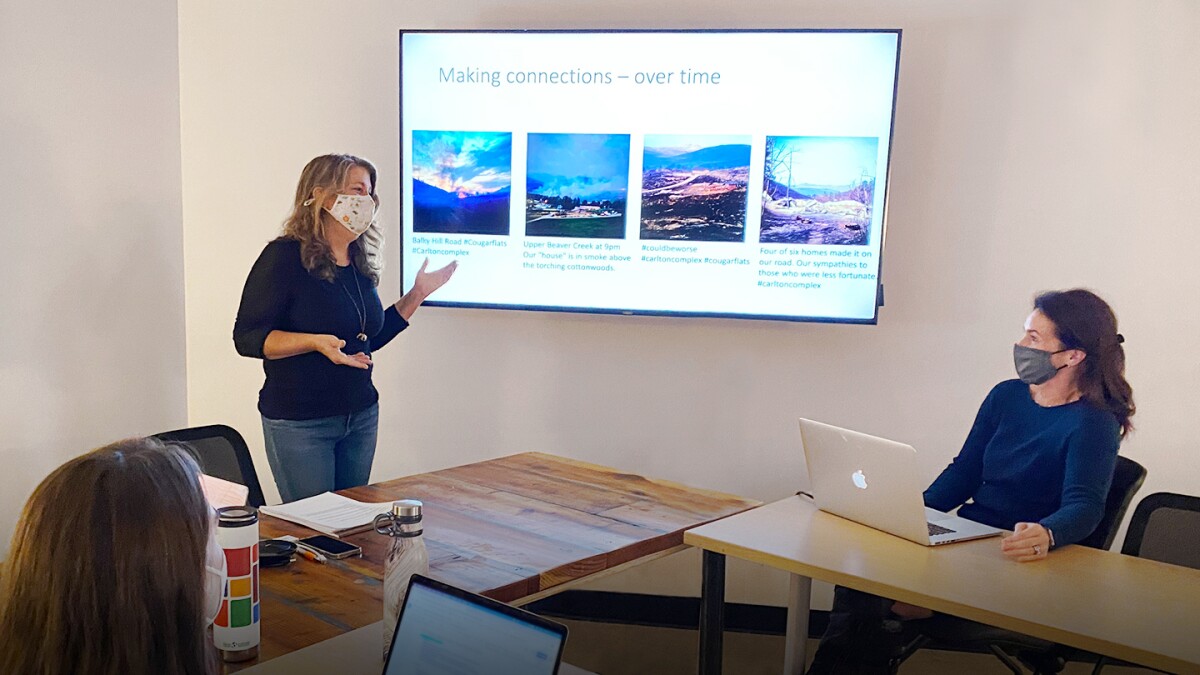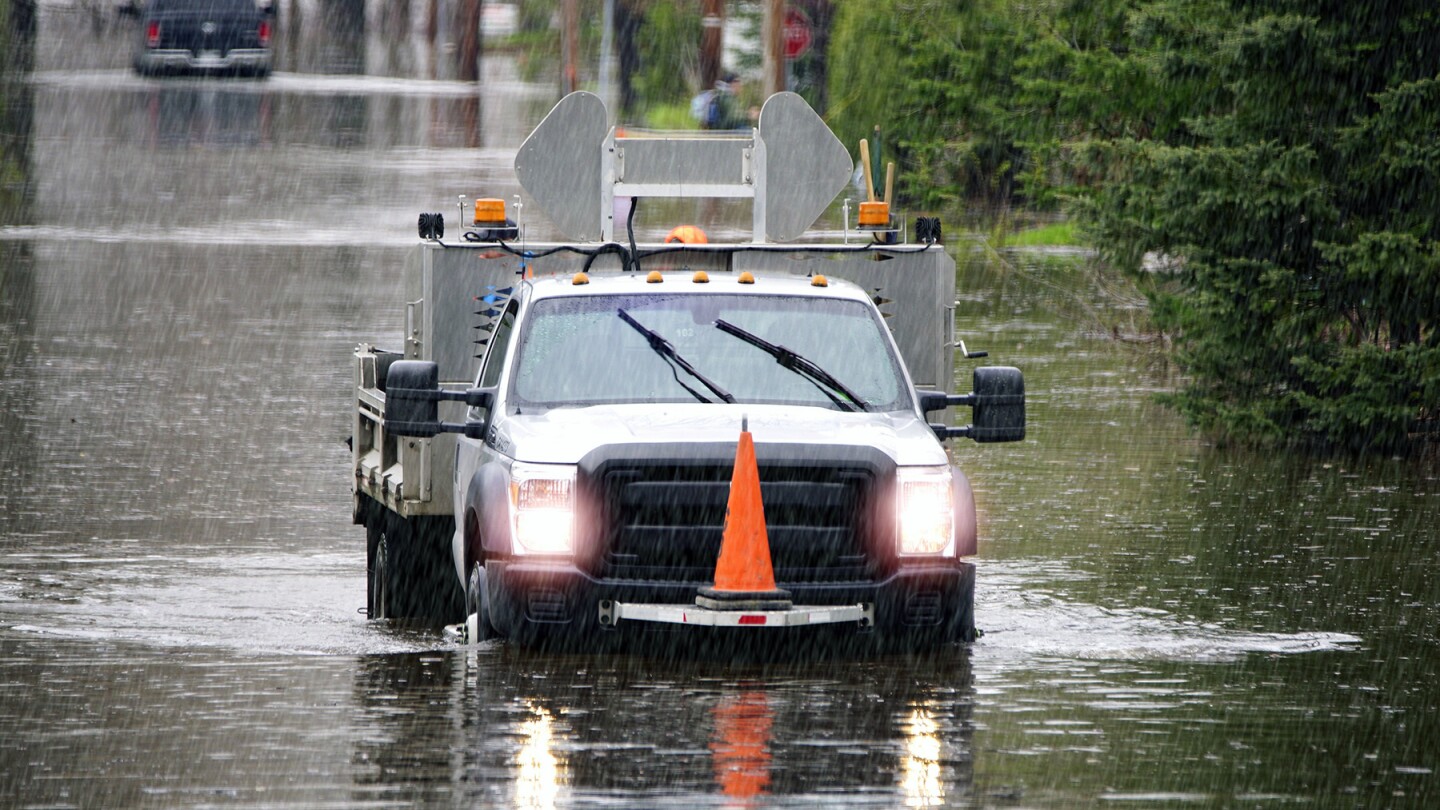Twitter, apart from being a place to catch up on niche topics and post personal takes on the latest news, can be a useful source of vital information during disasters.
Lise St. Denis, a research scientist at the University of Colorado’s Earth Lab, notes social media sites of all stripes can be useful in storms, but also in wildfires, floods, hurricanes, and other natural disasters — because fast, local information is essential in these situations. However, separating truly useful info from the noise is key, which is what St. Denis has been working on for the past half-decade.
“My big vision is that emergency response teams and communities impacted by disasters could get the best possible information out in real time so communities can be optimally informed about what's happening,” she says.
This kind of work requires a marriage of creative thinking and technology, something St. Denis, a 2019 AWS Machine Learning Research Award recipient, has pursued since the beginning of her career.

At least as far back as college, St. Denis has had a variety of interests she took seriously, despite their seeming disparity. Her undergrad degrees from Colorado State University are in fine arts and computer science. That brought her to illustration and software engineering in her early working life, first at Hewlett Packard. HP supported her graduate work in human factors engineering at the University of Idaho.
She took a break when she had children in the early 2000s, and when she was ready to return to the workforce, she realized she wanted to refine her skills. “I still had a lot of the same interests, but with a different life perspective — I was older. I wanted to do something that I felt like I was making a difference,” says St. Denis. So she went back to graduate school in 2011 initially for a masters in computer science, which led her to the University of Colorado where she discovered Project EPIC (Empowering the Public with Information in Crisis) where she decided to pursue an interdisciplinary doctorate in crisis informatics.
As part of the work for her degree, she met a group of emergency responders, became fascinated by their work, and set out to learn more. She realized that one big challenge they faced was getting the word out to the public. Could, she wondered, social media sites help gather and distribute information?
So when she heard about a plan in New Mexico to adapt the idea of digital volunteerism to emergency risk response — the volunteers in this case would be emergency responders — she went to learn from them.
At the time, social media wasn’t widely embraced within the emergency response field; St. Denis even knew government officials who risked their jobs using social media at work. “A lot of emergency response organizations just saw social media, not as useful, but as more of a hotbed for misinformation and rumor,” says St. Denis.
Even in light of that, some emergency managers remained interested: “As social media gained popularity, they knew this is where they needed to provide updates, engage with a growing audience, and look for breaking information,” recalls St. Denis.
“They formed this network of teams that were called Virtual Operational Support Teams. These teams are known ahead of time and activated through formal emergency protocols and procedures. The first emergency trial of the concept was during the 2011 Shadow Lake Fire in Eastern Oregon. I ended up studying the innovations of this network of teams, and I worked within this community, alongside them, to understand what they were doing,” she explained.
Their work made sense to St. Denis, and so, instead of getting that master’s in computer science, she ended up using what she had learned in New Mexico as a basis for her cross-disciplinary PhD, which included computer science, but also incorporated classes in communication and sociology of disaster.
In 2014, St. Denis was asked to bring her reporting and analysis social media skills to the Carlton Complex fire in Eastern Washington. That fire burned through several communities with a high number of structures lost and very short evacuation windows. Unable to keep up with the speed of the fire’s impact, locals had no way to get their questions answered and there was, understandably, a lot of frustration.
“That convinced me that there had to be a better strategy for filtering and getting to the most relevant information needed during these events,” she says.
She was also wrangling data and doing analysis, and consolidating that information for the teams she was supporting. As part of her research, St. Denis was a part of close to 100 emergency response activations. “I studied the integration of social media into emergency response through virtual teams,” she explains. “And I kept asking myself, ‘What does it mean to integrate them?’”
Fast forward to today and she’s still researching that basic question. After earning her PhD at the University of Colorado in 2016, St. Denis stayed on at the university and is now a research scientist at Earth Lab. “We have all this existing information from all these different sources, and we want to do a better job of making it available so scientists can leverage it and make use of it for hazards analysis.”
Thus far, Twitter has shown the most promise for what St. Denis hopes to implement. The idea is that an emergency manager would receive a live stream of truly useful content, including selected tweets from reliable sources. “The managers could keep an eye on that as part of their emergency management response,” says St. Denis.
This is extremely practical, real-world information, that can help save lives because it is personalized, says St. Denis. The information is coming from community members who are directly impacted by these disasters. “It's not the media coverage or the broad outside information,” says St. Denis. “It contains new information such as what roads are passable or where fuel outages exist” or where information gaps exist such as, ‘I don't know where to evacuate my livestock,’ or ‘I need to know who has gas,’ or ‘Is my water supply safe to drink?’”
And while her research hasn’t yet translated into an actual tool for emergencies, St. Denis sees the light around the corner. She recently became part of the Pandemic Hyper-Accelerator for Science and Technology (PHAST). “As part of the PHAST program I have been paired with skilled entrepreneurs who are helping me to look at my problem from a systematic, opportunity-driven perspective,” she explains. “We’ve been interviewing emergency response and crisis response professionals across different contexts to understand specifics about the tools they are using, as well as the specific values of or consequences for information when it is found or not found.”
Utilizing machine learning
St. Denis first realized she would need to utilize machine learning when studying data from the Carlton Complex fire. “I realized that I had some intuition for how I could take the noise off the top to get to the information that I wanted. But the only way that was going to matter is if I could do that in near real time — which would require machine learning,” she says. So she applied for an AWS Machine Learning Research Award and received it in 2019.
She and her team used AWS Lambda and AWS Fargate to query the Twitter API for relevant tweets, and stored the raw data in Amazon S3. St. Denis also used standard machine learning libraries to build her prototype because she wanted everything to be open source. “We're hoping, as we move forward, to move into more sophisticated data collection and AWS tools,” she says.
St. Denis and her team have published two papers on the design of the work done so far, and proved that the prototype they’ve built works equally well across multiple types of hazards. They’ve even used it for work they did examining US-based public response to stay-at-home orders at the onset of the COVID-19 pandemic.
“I have spent over a decade working with some of the most innovative responders in the field, but fundamentally nothing has changed in terms of tools,” she says. “I think that this social media-based tool has a lot of potential, and so it's been really exciting. Now that I have this starter funding, it could go pretty quickly.”


















